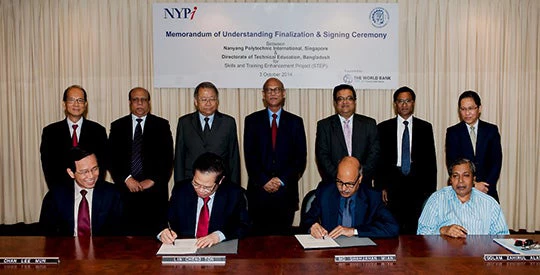Limited opportunities for teacher training has been a formidable obstacle in the path of building capacity for the Technical and Vocational Education and Training (TVET) institutions in Bangladesh. How can we train the trainers of vocational training institutions when there is an acute shortage of highly skilled workers, let alone trainers of trainers?
Most vocational trainers join training institutions after spending several years in their professional practices. For them, however, the opportunity of in-service training to keep up with latest technologies and learn modern pedagogical skills as part of continuous professional development is scarce, if at all. Over time, this creates serious gaps between what trainers can teach and what are really required of graduates by the industries, raising troubling questions about the quality and relevance of TVET. Trainers need to be trained for advanced technological knowledge and pedagogical skills. The component for institutional support under Skills and Training Enhancement Project (STEP), funded by the World Bank and Canada, was designed to provide teacher training opportunities for trainers of polytechnic institutions. However, major challenges arose when the institutions themselves were found to be lacking the capacity, for various reasons, to organize effective teacher trainings.
 A breakthrough happened in October 2014 when a formal partnership agreement was finally signed with
Nanyang Polytechnic International (NYPi) and Ministry of Education of Singapore, after months of coordination and discussion, with an aim of developing the capacity for a core group of polytechnics in Bangladesh. The NYPi-STEP alliance will establish a staff capacity development program for Bangladeshi TVET staff. For the period of two years, NYP will provide capacity building programs such as: (1) training opportunities for TVET faculty members to upgrade technical knowledge in identified technology areas; (2) management training for the ministry staff and TVET managers; and (3) special training to facilitate infrastructure development such as specialist laboratories and integrated technology teaching and learning systems.
A breakthrough happened in October 2014 when a formal partnership agreement was finally signed with
Nanyang Polytechnic International (NYPi) and Ministry of Education of Singapore, after months of coordination and discussion, with an aim of developing the capacity for a core group of polytechnics in Bangladesh. The NYPi-STEP alliance will establish a staff capacity development program for Bangladeshi TVET staff. For the period of two years, NYP will provide capacity building programs such as: (1) training opportunities for TVET faculty members to upgrade technical knowledge in identified technology areas; (2) management training for the ministry staff and TVET managers; and (3) special training to facilitate infrastructure development such as specialist laboratories and integrated technology teaching and learning systems.
Mr. Golam Md. Zahirul Alam, the Project Director of STEP, highlighted why this alliance is a significant milestone for the TVET in Bangladesh. “It is extremely important for our TVET institutions to take this opportunity because NYP has been globally known for their unique and effective vocational teaching methodologies, practice-oriented training methods, strong industry linkages, and pervasive culture of innovation. All of those are exactly what our TVET system needs to enhance its capacity for, and I firmly believe that we can learn a great deal of best practices from our new friend in Singapore.”
NYP was established in 1992 and is now the most renowned polytechnic institute in Singapore with 50 diploma courses and about 16,000 full-time students. NYP has provided technical support to TVET institutions in China under another World Bank funded project.
This partnership is the first of the kind for the TVET sector in Bangladesh to establish an official broad-based South-South cooperation with regional partners like NYP. At the signing ceremony, Mr. Alam reiterated his commitment to long-lasting partnership with NYP and cooperation between Bangladesh and Singapore.
“Through this agreement a long standing partnership will be established which will start with providing training to the managers and polytechnic teachers of Bangladesh. Our journey to improve the quality of TVET will get a new shape through this specialized training and other support from NYP. We would like to explore more areas of technical cooperation and collaboration with Singapore, and I look forward to seeing the successful implementation of this new ambitious partnership.”
The first batch of Bangladeshi trainees is expected to arrive in Singapore in December 2014, and soon many more will follow.



Join the Conversation